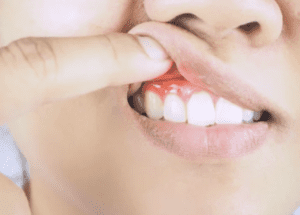Have you noticed a change in your gum line? Your gum line can begin to recede from your teeth for a variety of reasons. However, gum recession happens gradually, so the change may be too subtle for you to notice initially.
Gum recession can be a sign of gum disease, which is an infection of the gums. This infection can range from gingivitis (red, swollen gums) to periodontitis (a more severe condition). When the gums recede, the gum tissue wears away or pulls back from the teeth, exposing more of the tooth.
“Pockets” or gaps form between the teeth and the soft gum tissues, which makes it easier for plaque and bacteria to build. These pockets make it difficult to remove plaque from your teeth and gums adequately, and plaque can harden into tartar if not removed properly. Tartar is a solidified version of plaque that can only be removed by a dental professional
The longer you go without seeking treatment, the more your gums will recede. Other than a more “toothy” smile, you can experience several other concerning issues, such as tooth decay, black dental triangles, or tooth, tissue, and bone loss. Therefore, it is best to contact your dentist as soon as you see a change in your gums.

Causes For Receding Gums
Other than gum disease, several factors can create gum recession.
Poor Oral Health
Your oral health routine can have a significant impact on your gums. Aggressive brushing or inadequate daily care can directly affect the health of your gums. For example, you may brush your teeth the recommended times per day. However, applying too much pressure can damage the soft tissue in your gums and wear away the enamel on your teeth.
Over time, this can cause them to recede. Unfortunately, as gums recede, it becomes increasingly more challenging to clean your teeth properly. In addition, lack of oral care, such as not flossing or brushing your teeth, can cause gum recession, as it is a sign of gum disease.
Behaviors and Habits
Behaviors and habits can contribute to gum recession. If you grind your teeth, you are more likely to have receding gums. Grinding your teeth puts excess stress on your teeth and jawbone, which can cause the gums to recede and damage your teeth.
Along with teeth grinding, chewing or smoking tobacco can put you at risk for receding gums. This is because tobacco users are more likely to have “sticky” plaque, which is plaque that is difficult to remove from your teeth. The increase in plaque can lead to tooth decay and gum disease.
Genetics and Hormones
There are causes of gum recession that may be beyond your control. For example, changes such as puberty, pregnancy, or menopause, can trigger gum recession. In addition, the hormone fluctuation can make the gums more sensitive, making them more susceptible to recession.
Even genetics can play a part in receding gums. According to some studies, nearly 30% of the population is predisposed to gum disease, even if they take great care of their teeth.
